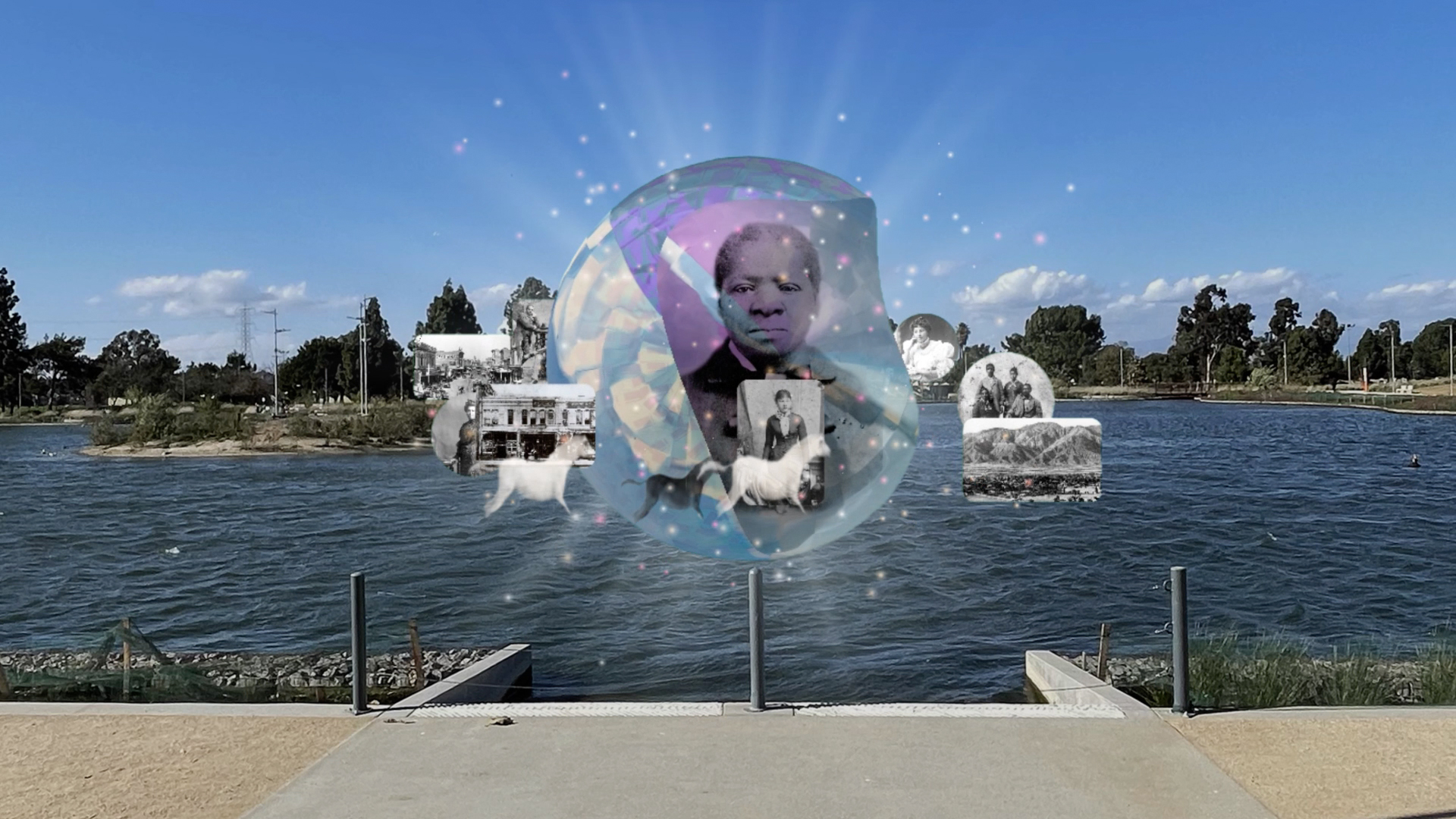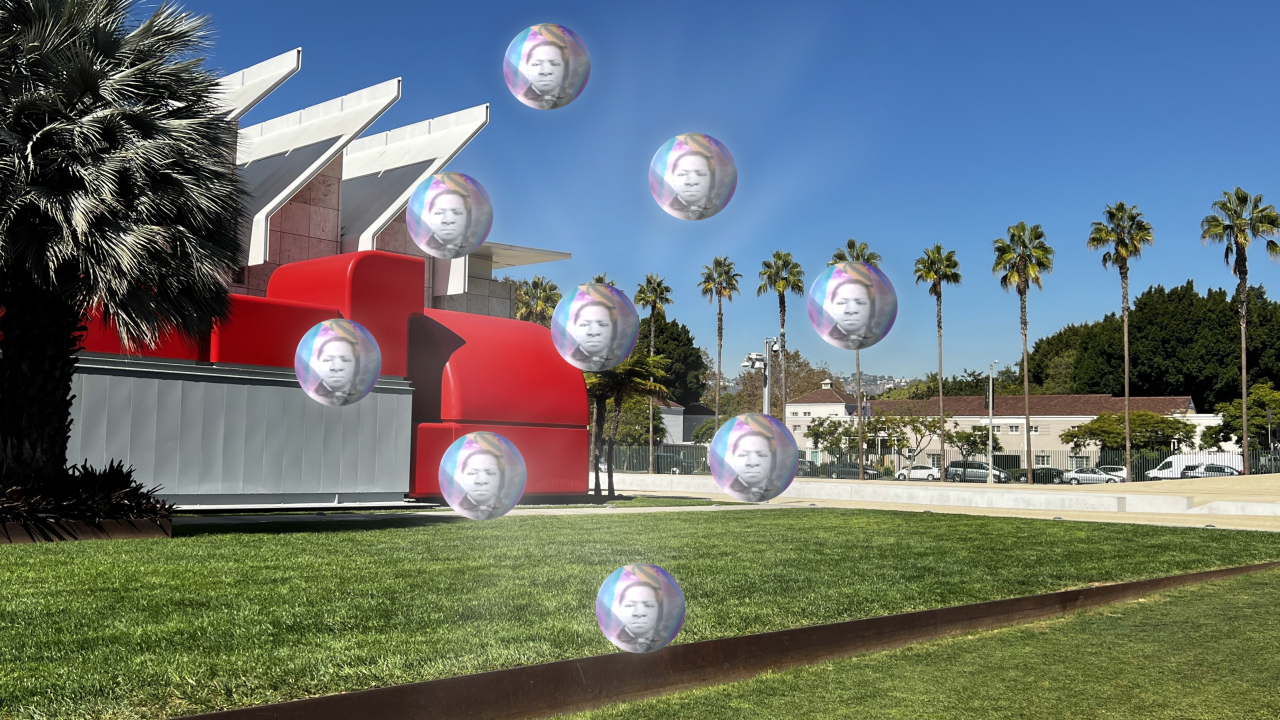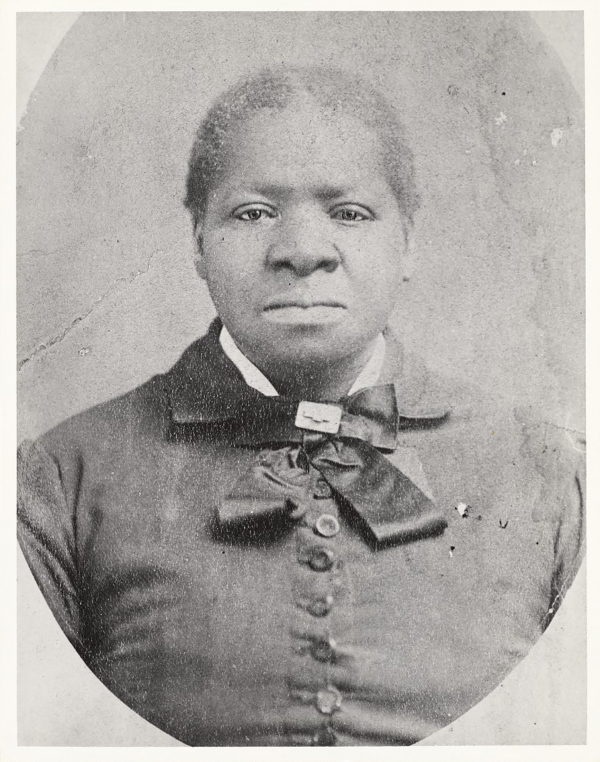Born in Mississippi, Bridget “Biddy” Mason was one of the most prominent citizens and landowners to have lived in Los Angeles. In 1851, Mason arrived in San Bernardino, California, after traveling thousands of miles by foot as an enslaved person from Mississippi. After this arduous journey, she successfully fought for and won her freedom through the court system in 1856, at the age of 38. She settled in Los Angeles and worked as a nurse and midwife and amassed a fortune. During her life, she was a patron who funded many schools and individuals throughout the region. She also founded the First African Methodist Episcopal (AME) Church in Los Angeles in 1872. Mason died a free person and one of the wealthiest Black women in the country. Her story is one of resilience.
Inspired by her own personal connection to Mississippi, artist Ada Pinkston came across the story of Biddy Mason while researching the narratives that have been excluded from the histories of Los Angeles. “I was thinking what is the counter narrative to the architecture that exists in Los Angeles and throughout the United States,” she says. No stranger to the discussions around monumentality, Ada brought her ongoing practice, thought, and research to the realm of augmented reality for LACMA × Snapchat: Monumental Perspectives. Pinkston proposed The Open Hand is Blessed at Earvin “Magic” Johnson Park to be a memorial series that pays tribute to the voice and spiritual philosophy of Mason, as part of the project's inaugural cohort of artists that examined key moments, figures, and monuments in the region’s past and present through augmented reality experiences.

On the occasion of the exhibitions The Obama Portraits Tour and Black American Portraits opening at LACMA on November 7, 2021, LACMA and Snapchat commissioned a new augmented reality version of The Open Hand is Blessed to be included in Black American Portraits and enter LACMA’s permanent collection. In The Open Hand is Blessed, Ada centers a portrait of Biddy Mason and archival images of African American residents in 19th-century Los Angeles among animated floating orbs, overlaid with soft watercolors in purple, magenta, and blue hues. The artist considers orbs to be light energies and fragments of a person’s memory and, for the project, she examined recent images of sound and space and contemplated “what happens to the particles of a person when they move on and how those particles impact the space in between and memory of a person.” Ada created over 90 different watercolor paintings that represent an ever-moving energy source to be digitally incorporated in the AR lens.

Located near the Smidt Welcome Plaza at LACMA, The Open Hand is Blessed includes a grid of spheres at a 36-degree angle, the angle of the layout of Downtown Los Angeles—where Biddy Mason’s home is commemorated by the Biddy Mason Memorial Park. “AR has a lot of potential for having a space for public interaction and conversation outside of this brick-and-mortar architecture that we usually see in monumental spaces,” Pinkston says. The artist often asks herself: What does a monument for all people look like? Where would that monument be? AR pushed Pinkston to discover new ways of activating these empty spaces. “I view these spaces as metaphors for the silences that exist in history,” she explains. With the heightened discussions around monuments and public spaces, Pinkston continues to reimagine the spaces where these monuments once stood.

Ultimately, Pinkston wants people to think about what other gaps there are in the stories of the past. “I really want users to go through and do their own research after experiencing the lens,” she says. “I want users to feel intrigued. I want them to feel more knowledgeable and a greater sense of agency around doing their own research of where they live.” Indeed, her AR lens joins her ongoing projects encouraging people to reimagine and research the ways people live and pass down history.

Black American Portraits also includes an oil painting of Biddy Mason by Elizabeth Colomba. Reclaiming history and anchoring the spirit of the African diaspora, Colomba references Old Masters techniques—Woman Holding a Balance by Johannes Vermeer first comes to mind—while incorporating elements that are specific to Mason’s biography. Colomba depicts Mason sitting facing the viewer with her right arm resting on an office desk. Placing her in a powerful and contemplative pose, surrounded by herbs and tools she would have used as a midwife, Colomba honors Mason's legacy in Los Angeles and American history.
The Obama Portraits Tour and Black American Portraits will be on view at LACMA from November 7, 2021.
Ada Pinkston (b. USA) is a multimedia artist, educator, and cultural organizer based in Baltimore, Maryland. Her art explores the intersection of imagined histories and sociopolitical realities on our bodies, using monoprint, performance, video, and collage. Inter-subjective exchanges are the primary substrate of her work. In addition to her studio practice, she is a co-founder of the LabBodies Performance Art Laboratory in Baltimore, Maryland. She is currently a lecturer in Art Education at Towson University.
Elizabeth Colomba (b. France) was raised in Épinay-sur-Seine, from parents of Martinican descent, and currently lives and works in New York City. Through her work, she reclaims history and anchors the spirit of the African diaspora by exploring the totality of social experience and including both her French and Caribbean heritage. She creates compositions for her subject matter to inhabit a space that honors their presence and place in and through culture and time.



